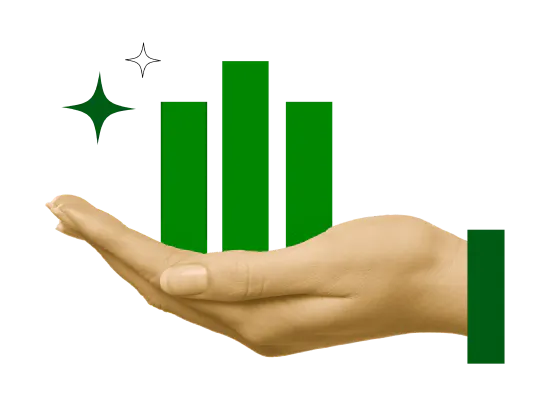Average overall debt
This report provides a picture of average American debt through 96.2 million Credit Karma members with a combined overall debt of more than $9.4 trillion. Overall debt is defined as any type of debt noted on a Credit Karma member’s credit report. This includes credit card, mortgage, student loan, medical loan, auto lease and auto loan debt.
Average total debt continued upward trend in first half of 2025, with slow but steady growth across generations and credit bands
Between April and June 2025, average total overall debt among Credit Karma members rose to $57,547, a 1.11% quarter-over-quarter increase and 2.99% increase from October to December 2024. Total debt overall has been creeping up quarter over quarter, but this slow-yet-steady rise has now amounted to a notable 4.38% increase YoY.
In the second quarter of 2025, debt increased slightly QoQ for all generations in credit card, mortgage, student loan and auto loan debt. And for the second quarter in a row, average education debt saw the highest QoQ growth of all categories (+3.39% in Q1, +1.70% in Q2).
Gen Z continues to see the fastest-growing average debt
Generation Z still leads the way in debt growth among generations, with the highest increase from Q1 to Q2 (+3.18%), and in Q2 versus Q4 2024 (+7.45%). That’s a significantly faster rate than millennials (1.85% and 4.89%, respectively). Year-over-year average debt for Gen Z increased 13.41%.
Notably, Gen Z has had the fastest-growing credit card debt every quarter for more than a year with the exception of last quarter (Q1). Gen Z has also accumulated the most mortgage debt every quarter for the past 12 months.
Average student loan debt continues to rise
Members in the near prime score band saw the highest gain in debt in Q2 2025 versus Q4 2024, driven by significant gains in credit card and education debt: up 3.45% for average card debt and 33.18% for student loans.
Student loan debt grew markedly in Q2 versus Q4 2024 for all score bands — up 23.98% for subprime and 20.33% for prime. The only scoreband that didn’t see an increase in average student loan debt — and in fact saw a significant decrease — was super prime (down 10.50%).
Average inquiries are down again, while average open collections continue to climb
Pressures from debt growth and general economic uncertainty are likely causing members to pump the brakes when it comes to taking on more debt. This is reflected in a significant 15.62% drop in average number of inquiries (3.2 to 2.7) YoY.
Average debt among Credit Karma members broken out by generation
| Generation | Average of total debt Oct.-Dec. 2024 | Average of total debt Jan.-March 2025 | Average of total debt Apr.-June 2025 | Q2 2025 vs. Q4 2024 change in debt |
|---|---|---|---|---|
| Generation Z | $21,739 | $22,638 | $23,359 | 7.45% |
| Millennial | $59,910 | $61,699 | $62,838 | 4.89% |
| Generation X | $68,280 | $69,301 | $69,950 | 2.45% |
| Baby boomers | $55,469 | $56,029 | $56,357 | 1.60% |
| Silent | $43,176 | $43,567 | $43,846 | 1.55% |
Gen Z’s YoY average debt (Q2 2025 vs. Q2 2024) growth stands at 13.41%, the highest of all generations. Still, Generation X continues to hold the highest average amount of debt — roughly three times that of Gen Z at $69,950 in Q2 2025.
Average debt among Credit Karma members by credit score band
| Credit score band | Average total debt Oct.-Dec. 2024 | Average total debt Apr.-June 2025 | Q2 2025 vs. Q4 2024 change in debt |
|---|---|---|---|
| Subprime (300–600) | $36,898 | $37,135 | 0.64% |
| Near prime (601–660) | $45,034 | $47,348 | 5.14% |
| Prime (661–780) | $61,835 | $63,628 | 2.90% |
| Super prime (781–850) | $78,402 | $80,879 | 3.16% |
Higher credit score bands may tend to see greater growth in average debt because people with higher credit scores have greater access to credit on better terms — but in Q2 2025 versus Q4 2024 near prime members had the greatest increase in average debt. In fact, members in the near-prime score band — while still having the least debt after subprime — also had the greatest YoY increase in average debt growth (6.54% in Q2 2025 vs. Q2 2024), with prime a close second (5.10%).
Average credit card debt
In the second quarter of 2025, approximately 91 million Credit Karma members with at least one credit card held a total of approximately $547.9 billion in credit card debt.
All generations saw slight decreases (averaging -2.44%) in Q2 2025 versus Q4 2024 .
Average credit card debt among Credit Karma members by generation
| Generation | Average credit card debt Oct.-Dec. 2024 | Average credit card debt Apr.-June 2025 | Q2 2025 vs. Q4 2024 percent change in credit card debt |
|---|---|---|---|
| Generation Z | $3,764 | $3,744 | -0.53% |
| Millennial | $7,692 | $7,558 | -1.74% |
| Generation X | $10,221 | $10,055 | -1.62% |
| Baby boomers | $8,328 | $8,124 | -2.45% |
| Silent | $5,710 | $5,512 | -3.47% |
Despite the slowdown in average card debt growth in Q2 versus Q4 2024, average debt was slightly up QoQ and YoY. Gen X continued to have the highest average credit card debt, but Gen Z still has the highest YoY growth in average card debt (6.76%), followed by Millennials (4.71%).
Average credit card debt among Credit Karma members by credit score band
| Credit score band | Average credit card debt Oct.-Dec. 2024 | Average credit card debt Apr.-June 2025 | Q2 2025 vs. Q4 2024 percent change in credit card debt |
|---|---|---|---|
| Subprime (300–600) | $7,760 | $7,784 | 0.31% |
| Near prime (601–660) | $11,389 | $11,628 | 2.10% |
| Prime (661–780) | $8,137 | $8,418 | 3.45% |
| Super prime (781–850) | $3,736 | $3,736 | -15.66% |
Looking at the change from Q4 2024 to Q2 2025, average card debt grew the most among members in the prime scoreband. Prime members had the greatest growth in average credit card debt YoY, while superprime showed a steady decrease (-9.38% QoQ, -15.66% in Q2 2025 versus Q4 2024 and -10.02% YoY) along with the Silent generation (+0.40%QoQ, -3.47% in Q2 2025 and -1.83% YoY).
Near prime members continued to have the highest average card balances.
Average auto loan debt
In the second quarter of 2025, approximately 66.8 million Credit Karma members with at least one auto loan open held more than $999 billion in loan debt. The average next payment was $668.
The average auto loan balance among members continued to remain nearly flat at $25,536 — only a 0.57% increase Q4 2024 to Q2 2025 from $25,391.
Average auto loan debt among Credit Karma members by generation
| Generation | Average auto loan debt Oct.-Dec. 2024 | Average auto loan debt April-June 2025 | Q2 2025 vs. Q4 2024 percent change in auto loan debt |
|---|---|---|---|
| Generation Z | $21,323 | $21,537 | 1.00% |
| Millennial | $25,521 | $25,779 | 1.01% |
| Generation X | $28,276 | $28,388 | 0.40% |
| Baby boomers | $23,566 | $23,729 | 0.69% |
| Silent | $19,204 | $19,348 | 0.75% |
Average auto loan debt among Credit Karma members by credit score band
| Credit score band | Average auto loan debt Oct.-Dec. 2024 | Average auto loan debt April-June 2025 | Q2 2025 vs. Q4 2024 percent change in auto loan debt |
|---|---|---|---|
| Subprime (300–600) | $23,994 | $22,702 | -5.38% |
| Near prime (601–660) | $25,843 | $24,668 | -4.55% |
| Prime (661–780) | $26,783 | $25,343 | -5.38% |
| Super prime (781–850) | $23,604 | $21,332 | -9.63% |
Average mortgage debt
From April through June 2025, approximately 34.4 million Credit Karma members with at least one mortgage held a total of more than $7 trillion in mortgage debt. The average next payment was $2,123.
The average mortgage balance among members was up slightly year over year at $268,293, a 3.43% increase from $259,407 in April to June 2024.
Average mortgage debt among Credit Karma members by generation
| Generation | Average mortgage debt Oct.-Dec. 2024 | Average mortgage debt April-June 2025 | Q2 2025 vs. Q4 2024 percent change in mortgage debt |
|---|---|---|---|
| Generation Z | $239,242 | $248,165 | 3.73% |
| Millennial | $298,617 | $305,785 | 2.40% |
| Generation X | $260,485 | $263,956 | 1.33% |
| Baby boomers | $198,425 | $200,588 | 1.09% |
| Silent | $173,700 | $175,400 | 0.98% |
In a continuing trend from last year, Millennials and Generation Z led the way in increases in average mortgage debt:
- Millennials had the most mortgage debt on average ($305,785) in Q2, followed by Gen X ($263,956) and Gen Z ($248,165).
- Gen Z members had the biggest increases among generations QoQ (1.71% from January to March 2025); from Q4 2024 to Q2 2025 (3.73%); and YoY (7.15%).
Average mortgage debt among Credit Karma members by credit score band
| Credit score band | Average mortgage debt Oct.-Dec. 2024 | Average mortgage debt April-June 2025 | Q2 2025 vs. Q4 2024 percent change in mortgage debt |
|---|---|---|---|
| Subprime (300–600) | $224,720 | $212,649 | -5.37% |
| Near prime (601–660) | $240,212 | $223,669 | -6.89% |
| Prime (661–780) | $278,461 | $251,695 | -9.61% |
| Super prime (781–850) | $269,536 | $245,093 | -9.07% |
Average mortgage debt decreased the most among members in the higher credit score bands.
Average student loan debt
After seeing a higher year-over-year increase in average debt in Q4 2024 versus Q4 2023, student loan debt remains the highest-growth category of debt for members so far in 2025.
In the second quarter of 2025, approximately 31.8 million Credit Karma members with at least one student loan open held a total of more than $787 billion across 84.1 million student loans. The average next payment was $118.
The average student loan balance among members in the second quarter of 2025 was $33,297 — up 5.15% compared to the fourth quarter of 2024, when average student loan debt was $31,667 (and up 3.14% YoY).
Average student loan debt among Credit Karma members by generation
| Generation | Average student loan debt Oct.-Dec. 2024 | Average student loan debt April-June 2025 | Q2 2025 vs. Q4 2024 percent change in student loan debt |
|---|---|---|---|
| Generation Z | $17,470 | $19,028 | 8.92% |
| Millennial | $31,575 | $33,516 | 6.15% |
| Generation X | $43,451 | $45,963 | 5.78% |
| Baby boomers | $45,980 | $47,977 | 4.34% |
| Silent | $37,685 | $39,338 | 4.39% |
Year-over-year growth in average student loan debt continues to be greatest for Gen Z, with a leading 9.64% increase YoY. Millennials are close behind at +8.30% YoY. This follows a general pickup in student loan debt in the fourth quarter of 2024 versus the same period in 2023.
Average student loan debt among Credit Karma members by credit score band
| Credit score band | Average student loan debt Oct.-Dec. 2024 | Average student loan debt April-June 2025 | Q2 2025 vs. Q4 2024 percent change in student loan debt |
|---|---|---|---|
| Subprime (300–600) | $29,616 | $36,719 | 23.98% |
| Near prime (601–660) | $30,063 | $40,038 | 33.18% |
| Prime (661–780) | $33,377 | $40,163 | 20.33% |
| Super prime (781–850) | $35,640 | $31,897 | -10.50% |
If you want help with your student loans, Credit Karma’s student loan resource page can walk you through a simple, step-by-step process to check your loan status, learn about options for relief and find answers to common student loan questions.
Average credit scores
The average VantageScore 3.0 credit score for Credit Karma members with debt dropped to 670 in Q2 2025 vs. Q4 2025 — down 6 points since the fourth quarter of 2024 and 8 points YoY. This trend toward the lower end of the prime range is notable — with the Silent generation showing the biggest decrease, followed by boomers and Gen X — and could indicate that debt growth has begun to affect overall credit health.
Average VantageScore 3.0 score among Credit Karma members with debt by generation
| Generation | Average VantageScore 3.0 Oct.-Dec. 2024 | Average VantageScore 3.0 April-June 2025 |
|---|---|---|
| Generation Z | 659 | 651 |
| Millennial | 669 | 665 |
| Generation X | 673 | 669 |
| Baby boomers | 715 | 700 |
| Silent | 737 | 680 |
Accounts in collections
For this report, accounts in collections are any credit card, mortgage, student loan, medical loan, auto lease or auto loan accounts that have been sent to collections agencies, according to their credit reports. Creditors may have different standards for when they transfer debt to collections, but the typical cutoff is 120 to 150 days past due. For this report, we’re able to determine if an account is in collections but not how many days past due it is.
Among Credit Karma members with accounts in collections, the average number of open accounts (among those with collections on their credit reports)in October to December 2024 was 2.4 — relatively flat YoY from 2.3 in the fourth quarter of 2023. Two quarters later, the negative trend is more marked, perhaps driven by mounting debt and additional burdens triggered by the resumption of student loan payments.
Year over year (Q2 2024 to Q2 2025), average open collections increased for millennials nearly 52% (from 1.64 to 2.49), for Gen X by nearly 48%, and for Gen Z by just over 43%.
Members in the highest and lowest score bands — superprime and subprime, respectively — saw the biggest YoY increases in average collections: 26.39% for superprime (.72 to .91) and 30.37% (2.14 to 2.79) for subprime.
Keep in mind that this measure only looks at members who have open accounts in collections, not the Credit Karma member population as a whole. That means that it only captures people who are already potentially struggling with their finances.
Average number of accounts in collections among Credit Karma members by generation
| Generation | Average number of accounts in collections for Credit Karma members Oct.-Dec. 2024 | Average number of accounts in collections for Credit Karma members April-June 2025 | Q2 2025 vs. Q4 2024 percent change in average open collection accounts |
|---|---|---|---|
| Generation Z | 1.9 | 1.99 | 4.74% |
| Millennial | 2.4 | 2.49 | 3.75% |
| Generation X | 2.6 | 2.66 | 2.31% |
| Baby boomers | 2.3 | 2.33 | 1.30% |
| Silent | 1.9 | 1.93 | 1.58% |
Average number of accounts in collections by credit score band
| Credit score band | Average number of accounts in collections for Credit Karma members Oct.-Dec. 2024 | Average number of accounts in collections for Credit Karma members April-June 2025 | Q2 2025 vs. Q4 2024 percent change in average open collection accounts |
|---|---|---|---|
| Subprime (300–600) | 2.9 | 2.79 | 5.28% |
| Near prime (601–660) | 2.2 | 2.11 | 6.57% |
| Prime (661–780) | 1.3 | 1.29 | -0.77% |
| Super prime (781–850) | 0.9 | 0.91 | -4.21% |
Average credit inquiries
For this report, credit inquiries are applications for new credit, such as credit cards or loans. From Q4 2024 to Q2 2025, inquiries fell across all generations and scorebands, continuing a year-plus downward trend. This likely reflects a pullback on credit given various economic uncertainties around tariffs and interest rates, among other factors.
Subprime and near prime members had the biggest decreases in inquiries among score bands over the past six months.
Average number of credit inquiries by Credit Karma members by credit score band
| Credit score band | Average number of inquiries for Credit Karma members Oct.-Dec. 2024 | Average number of inquiries for Credit Karma members April-June 2025 | Q2 2025 vs. Q4 2024 percent change in inquiries |
|---|---|---|---|
| Subprime (300–600) | 4.8 | 4.1 | -22.93% |
| Near prime (601–660) | 3.8 | 3.2 | -22.71% |
| Prime (661–780) | 2.8 | 2.74 | -7.74% |
| Super prime (781–850) | 1.9 | 1.9 | -4.04% |
Average number of credit inquiries by Credit Karma members by generation
| Generation | Average number of inquiries for Credit Karma members Oct.-Dec. 2024 | Average number of inquiries for Credit Karma members April-June 2025 | Q2 2025 vs. Q4 2024 percent change in inquiries |
|---|---|---|---|
| Generation Z | 2.9 | 2.5 | -18.83% |
| Millennial | 3.2 | 3.1 | -10.40% |
| Generation X | 3.5 | 3.1 | -46.43% |
| Baby boomers | 3.3 | 3.18 | -12.15% |
| Silent | 2.8 | 2.74 | -11.61% |
Methodology
This report drew on insights from the aggregated reports of roughly 96.2 million Credit Karma users. All aggregate data analyzed was pulled on July 7, 2025, and came from members’ TransUnion credit reports. Averages were based on information from the previous 90 days.









